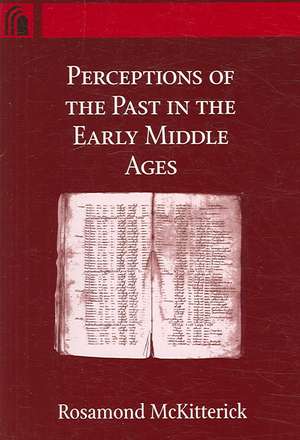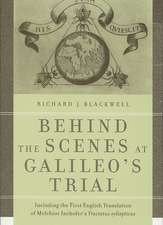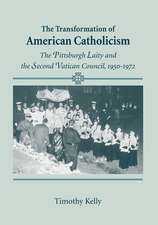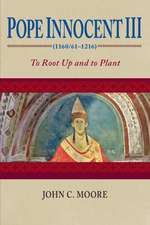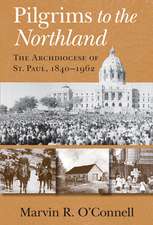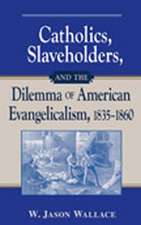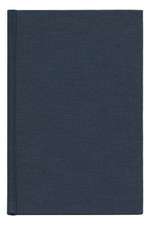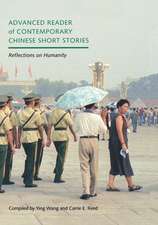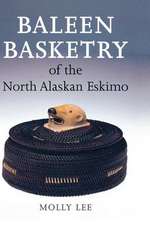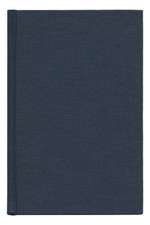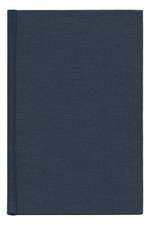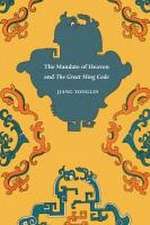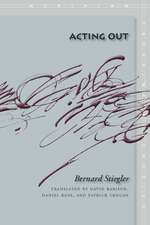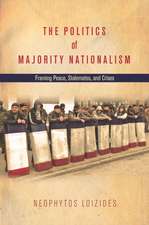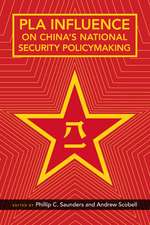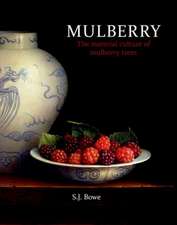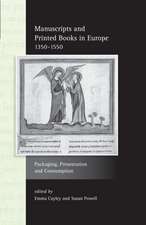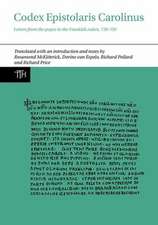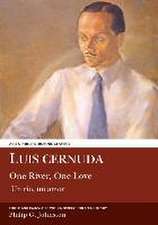Perceptions of the Past in the Early Middle Ages: Conway Lectures in Medieval Studies
Autor Rosamond Mckittericken Limba Engleză Paperback – 14 oct 2006
| Toate formatele și edițiile | Preț | Express |
|---|---|---|
| Paperback (1) | 226.12 lei 6-8 săpt. | |
| MR – University of Notre Dame Press – 14 oct 2006 | 226.12 lei 6-8 săpt. | |
| Hardback (1) | 585.11 lei 6-8 săpt. | |
| Wiley – 14 oct 2006 | 585.11 lei 6-8 săpt. |
Preț: 226.12 lei
Nou
Puncte Express: 339
Preț estimativ în valută:
43.27€ • 45.29$ • 36.01£
43.27€ • 45.29$ • 36.01£
Carte tipărită la comandă
Livrare economică 31 martie-14 aprilie
Preluare comenzi: 021 569.72.76
Specificații
ISBN-13: 9780268035006
ISBN-10: 0268035008
Pagini: 168
Dimensiuni: 152 x 228 x 14 mm
Greutate: 0.29 kg
Ediția:1st Edition
Editura: MR – University of Notre Dame Press
Seria Conway Lectures in Medieval Studies
ISBN-10: 0268035008
Pagini: 168
Dimensiuni: 152 x 228 x 14 mm
Greutate: 0.29 kg
Ediția:1st Edition
Editura: MR – University of Notre Dame Press
Seria Conway Lectures in Medieval Studies
Recenzii
“Rosamond McKitterick’s work is extremely influential and highly regarded across all disciplinary aspects of medieval studies. Her latest work, part three of the Conway Lectures at the Medieval Institute, Notre Dame series, is a continuation of her response to the cultural imaginings of the past in various literary historical periods. . . . McKitterick elegantly opens up new avenues of thinking about the Carolingians in the world and about their own sense of their role in history.” —Journal of American Folklore, 214:494, Summer 2011
“These studies, first offered as a lecture series at the University of Notre Dame, are here published with elegant illustrations and a full apparatus, reflecting the author's customary generosity to the work of other scholars.” —English Historical Review, 123:504, October 2008
“McKitterick expands upon earlier work in which she examined the writing and reading of history in the Frankish kingdoms of the eighth and ninth centuries, seeking out what was meant by history books, what the Franks understood of historical texts, and how they constructed and understood their past.” —Research Book News, November 2007
Notă biografică
Rosamond McKitterick is Professor of Medieval History at Cambridge University. She is the author and editor of over twenty books, including History and Memory in the Carolingian World.
Descriere
“What McKitterick calls the ‘explosion of historical writing’ in the Carolingian age marked the dawn of a radically new and lasting culture in Europe and disclosed the mind-sets of its creators. Yet, in many cases, published editions deform the texts, not least by omissions, and obscure what Frankish authors actually wrote. Building on her internationally acclaimed studies of oral and written communication in the early Middle Ages, McKitterick goes back to manuscript sources. As she advances a compelling new key to the catalysts of Europe’s historical identity, she discovers what Carolingians actually wrote and how they did their work.” —Karl F. Morrison, Lessing Professor of History and Poetics, Rutgers University
“As perceptive as it is learned, Rosamond McKitterick’s book unpicks the complex web of Frankish perceptions of the past. . . . McKitterick deftly transforms texts that previous scholars have usually dismissed into clues from which she draws cogent arguments. This study of historical imaginations in the past is itself a model of imaginative history.” —Anthony Grafton, Princeton University
Historical writing of the early middle ages tends to be regarded as little more than a possible source of facts, but Rosamond McKitterick establishes that early medieval historians conveyed in their texts a sophisticated set of multiple perceptions of the past. In these essays, McKitterick focuses on the Frankish realms in the eighth and ninth centuries and examines different methods and genres of historical writing in relation to the perceptions of time and chronology. She claims that there is an extraordinary concentration of new text production and older text reproduction in this period that has to be accounted for, and whose influence is still being investigated and established.
Three themes are addressed in Perceptions of the Past in the Early Middle Ages. McKitterick begins by discussing the Chronicon of Eusebius-Jerome as a way of examining the composition and reception of universal history in the ninth and early tenth centuries. She demonstrates that original manuscripts turn out in many cases to be compilations of sequential historical texts with a chronology extending back to the creation of the world or the origin of the Franks. In the second chapter, she explores the significance of Rome in Carolingian perceptions of the past and argues that its importance loomed large and was communicated in a great range of texts and material objects. In the third chapter, she looks at eighth- and ninth-century perceptions of the local past in the Frankish realm within the wider contexts of Christian and national history. She concludes that in the very rich, complex, and sometimes contradictory early medieval perceptions of a past stretching back to the creation of the world, the Franks in the Carolingian period forged their own special place.
